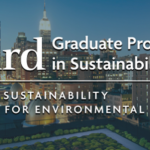Sustainability | Bard
The Bard MBA in Sustainability prepares students for leadership positions in a variety of business environments—from innovative start-ups to major corporations. The program fully integrates a focus on sustainability and mission-driven business into a core MBA, with optional concentrations in Circular Value Chain Management and Impact Finance.
How does the programme provide content to ensure students achieve an understanding of a reasonably diverse set of perspectives on understanding economies?
Bard’s MBA in Sustainability program has a curriculum that focuses on three verticals: sustainability vision (how to see business or non-profit opportunities where other people see social and environmental costs); leadership (how to engage others in that vision); and business execution (how to build and sustain an organization that delivers on the vision). To that end, we have an integrated set of courses in sustainable management, economics, finance and organizational design that emphasize practical application in the integration of these verticals.
How does the programme ensure students understand the interaction between economic and ecological systems?
All students take a course in Principles of Sustainable Management and Economics for Sustainability that emphasizes these interactions in a systems-thinking context.
How does the programme ensure students understand how to critically explore real-world evidence, both qualitative and quantitative?
The Bard MBA focuses on understanding best practices for sustainable business management. Much of this is done through experiential and project-based learning, including a required year-long course in sustainability consulting. In addition, students have required courses in Data for Decision-Making, as well as Accounting and the Integrated Bottom Line.
What pedagogical approaches does the programme use to ensure that students examine the historical context, assumptions and values in all economic thinking?
Bard’s definition of sustainability encapsulates our values: “Shared Well-Being on a Healthy Planet.” More specifically, students engage with a critique of neo-liberalism and the transition to a sustainable management paradigm in POSM, Economics, Finance and Sustaining Mission classes, and there is some basic history of thought in these courses as well.
How does the department ensure that the teaching culture and capacity to deliver economic pluralism are continually improving?
At its inception, the Bard MBA instituted a process for iterative student input as part of a commitment to continuous improvement. As such, a Student Council convenes monthly to discuss concerns. The council facilitators then bring challenges to administration. Additionally, each month the entire community gathers for a meeting where outstanding problems and solutions are discussed. At these meetings, administration also reports on progress regarding previously identified concerns. This process has effectively guided the program through various challenges, and also serves to model a flat and participatory organization for students to carry into their own management careers. Arising out of this process, the program has made a commitment to integrate a focus on anti-racist business leadership training across the curriculum. At its inception, the Bard MBA instituted a process for iterative student input as part of a commitment to continuous improvement. As such, a Student Council convenes monthly to discuss concerns. The council facilitators then bring challenges to administration. Additionally, each month the entire community gathers for a meeting where outstanding problems and solutions are discussed. At these meetings, administration also reports on progress regarding previously identified concerns. This process has effectively guided the program through various challenges, and also serves to model a flat and participatory organization for students to carry into their own management careers. Arising out of this process, the program has made a commitment to integrate a focus on anti-racist business leadership training across the curriculum. At its inception, the Bard MBA instituted a process for iterative student input as part of a commitment to continuous improvement. As such, a Student Council convenes monthly to discuss concerns. The council facilitators then bring challenges to administration. Additionally, each month the entire community gathers for a meeting where outstanding problems and solutions are discussed. At these meetings, administration also reports on progress regarding previously identified concerns. This process has effectively guided the program through various challenges, and also serves to model a flat and participatory organization for students to carry into their own management careers. Arising out of this process, the program has made a commitment to integrate a focus on anti-racist business leadership training across the curriculum. At its inception, the Bard MBA instituted a process for iterative student input as part of a commitment to continuous improvement. As such, a Student Council convenes monthly to discuss concerns. The council facilitators then bring challenges to administration. Additionally, each month the entire community gathers for a meeting where outstanding problems and solutions are discussed. At these meetings, administration also reports on progress regarding previously identified concerns. This process has effectively guided the program through various challenges, and also serves to model a flat and participatory organization for students to carry into their own management careers. Arising out of this process, the program has made a commitment to integrate a focus on anti-racist business leadership training across the curriculum.
Country:
USA
University:
Bard
Course name:
Sustainability
Department/school:
Centre for Environmental Policy
Course level:
MBA
Course language:
English

 all programmes
all programmes